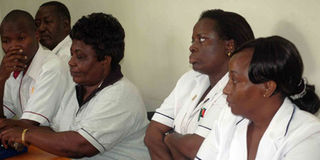Power games blamed for shortage of drugs

Nurses at Coast General Hospital in Mombasa listening to Mombasa Governor Ali Hassan Joho addressing the doctors' strike on August 19, 2014. Kisumu health officials have implicated power struggles for the acute drug shortage in county hospitals. FILE PHOTO | LABAN WALLOGA | NATION MEDIA GROUP
What you need to know:
- Kisumu County Executive for Health Elizabeth Ogaja said delayed disbursement of funds to counties affected planning at the hospitals.
- Anti-malarial drugs, rehydration salts, pain killers, ARVs, and antibiotics are some of the drugs that have been reported to be in short supply in the institutions.
- Some of the counties that recently reported a shortage are Siaya, Vihiga, Busia and Homa Bay.
Health officials have implicated power struggles for the acute drug shortage in county hospitals.
Many health institutions are short of drugs because of delays in funds release from the National Treasury and long procurement processes.
Kapkatet District Hospital Medical Superintendent Kenneth Sigilai, in Kericho, said that before devolution of health services, hospitals were allowed to place orders to the Kenya Medical Supplies Agency (Kemsa) and the National Treasury made payments directly to it.
The institutions now have to pay Kemsa by themselves using funds they receive from county governments.
However, obtaining money from the county governments takes time due to bureaucracy and delay of disbursement from the national government, Dr Sigilai says.
In addition, the Public Finance Management Act requires hospitals to bank all their revenue with the county government, unlike before when they kept the cash.
“We give our revenue and then we get stuck since they release funds late.
“Even small monies necessary for attending to emergencies are nowadays not there,” he said.
DELAYED DISBURSEMENT
Dr Amos Otedo of Kisumu East District Hospital said drugs can only be purchased after budgets prepared by hospitals are approved by the county government.
Kisumu County Executive for Health Elizabeth Ogaja said delayed disbursement of funds to counties affected planning at the hospitals.
Initially, a hospital facility improvement fund was in place and the institutions would be given money depending on their work plan, but with devolution, they have to wait for funds from the National Treasury.
“One of the things we need to address is the late disbursement of money where after a long wait, they are released in bits,” Vihiga County Executive for Health Silas Kipkemboi said.
Hospitals cannot buy drugs for six months in advance due to lack of funds. That makes them run out of stock, he said.
Dr Kipkemboi said that although the national government should give some drugs to counties, it is not doing so.
He also blamed long procurement processes and lack of funds that ensured counties were unable to place orders on time.
“Kemsa has always advised that we send our orders in time to avoid running out of stock, but it is not possible because the funds are not available.”
POOR DRUG DISTRIBUTION
For Kakamega County Executive for Health Elsie Muhanda, the problem is a result of poor distribution of drugs in health facilities across counties.
Anti-malarial drugs, rehydration salts, pain killers, ARVs, and antibiotics are some of the drugs that have been reported to be in short supply in the institutions.
Some of the counties that recently reported a shortage are Siaya, Vihiga, Busia and Homa Bay.
Kemsa denied that it was to blame. Mr Dominic Kabiru, its public relations and communications manager, said the agency was able to deliver drugs to counties.
However, it is the responsibility of county governments to determine the need of their health institutions and place orders.
“We have all the drugs in store. It is upon the counties to tell us the drugs they need and we shall supply very fast,” he said yesterday during a telephone interview with the Nation.
He said Kemsa is operating a medical superstore model, whereby counties submit their orders and make payments before they get deliveries.
“Upon submission of orders and payment, Kemsa processes the orders and dispatches medical commodities.”





